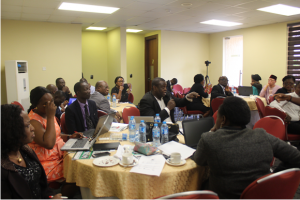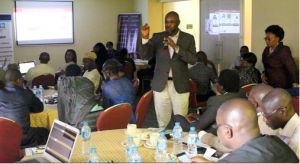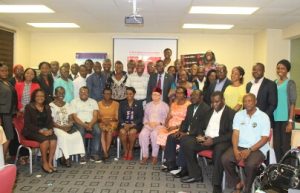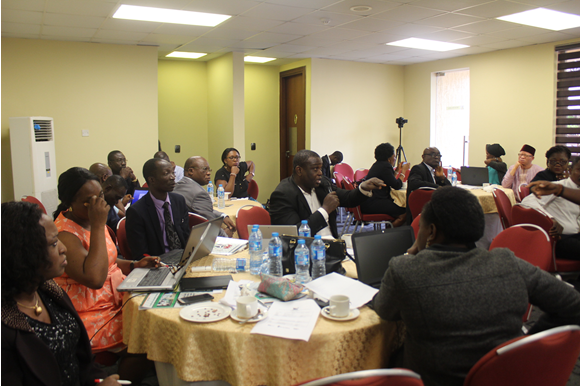Task Shifting, Task Sharing: New route towards MDGs achievement?
● All eyes on Lagos on plans to domesticate policy

Nigeria is reputed to have one of the largest stocks of human resources for health (HRH) in Africa. Unfortunately, the number of doctors, nurses and midwives aviailable nationwide to effectively deliver essential health services does not give enough backing to this. It is grossly inadequate due to a number of reasons such as migration to foreign countries, inadequate production and inequitable distribution, among others.
While the World Health Report 2006 suggested a minimum worker density threshold of 2.3 workers (Doctors, Nurses and Midwives) per 1000 Population or 23 per 10,000, to achieve adequate coverage rate for key primary health-care interventions prioritized by Millennium Development Goals (MDGs), Nigeria’s health worker density reportedly hovers around 1.95 per 1,000.
In Lagos State for instance, findings of its HRH assessment revealed that the current number of health workers in the state had declined from 14,984 workers in 2010 to a total of 13,724 in 2016. The report also revealed that the state currently has an estimated 17.30 doctors and nurses per 10,000 population to deliver essential maternal and child health services as against 23 per 10 000 population recommended by the World HealthOrganisation (WHO).
According to a study on Nigeria’s HRH, the country will need approximately 149,852 doctors and 471,353 nurses by the year 2030. With the available growth rate of Doctors/Nurses, by this same period only 99,120 doctors and 333,494 nurses will be available. This implies a shortage of about 50,120 doctors and 137,859 nurses.
This also translates to 33.45% gap in doctors’supply and 29.25% gap in nurses’ supply, making the country’s achievement of the MDGs almost a mirage, considering the obvious fact that such achievement is dependent heavily on the availability of adequate health workforce. Indeed, no nation can talk of access to qualitative health care for its people without an adequate and qualitative health workforce.
As part of efforts to address the nation’s health workforce shortage, the Federal ministry of health, in 2015, developed the Task-Shifting and Task-Sharing (TSTS) policy for adoption and implementation at all levels of the national health system.
The TSTS is a concept designed by the WHO as a temporary measure to resolve the challenges of health work force shortage by countries, especially in the African region. Task Shifting, according to the organisation involves “the rational redistribution of tasks among health workforce teams. Specific terms are moved, where appropriate, from among highly qualified health workers with shorter trainibg and fewer qualifications in order to make more efficient use of the available human reslurces for health.
Task Sharing on the other hand, allows a wider range of cadres to offer certain services, when this can be done safely and effectively as a means of rapidly expanding acess and improving health care,
“The goal of task shifting or sharing is simply to get the right worker with the right skills in the right places doing the right thing without necessarily abandoning other methods of increasing the number of qualified health workers,” the Federal TSTS policy notes.
The concept is already in use in some African countries to address the human resources shortages in certain critical health service such as HIV testing and treatment with antiretroviral drugs, community distribution of contraceptives, malaria diagnosis and treatment among others, with good results. Such countries include Malawi, Uganda, Lesotho, Swaziland, South Africa, Zimbabwe, among others.
Now, health experts and stakeholders believe that the TSTS concept could be what Nigeria needs to bail her out of chronic health workers shortage, especially in the rural areas.
Always the leader in Nigeria’s health care system, Lagos state is already working towards the adoption of TSTS.
It was indeed a very exciting moment as the State Ministry of health, supported by Save the Children International and other development partners- FHI 360 and the Nigerian Urban Reproductive Health (NURHI 2), gathered representatives from all caders of health professionals in the state at the Sojourner by Genesis Hotel, Ikeja from July 5-7 to help develop a specific TSTS policy for the state, using the National TSTS policy as a template.

Fully briefed about the objective of the 3-day meeting, which was to work towards the domestication of the TSTS policy to address the shortage of health workers, the associated embargo on the recruitment of new workers and poor distribution of health staff within the urban/local locations of the state, the health workers, generally reputed nationwide for frequent agitations over welfare packages, professional and sometimes political issues, dropped every parochial tendencies to work out practical ways the state could use TSTS to provide citizens with effective health care services.
The cameradery, unbiased and friendly dispositions towards divergent views were simply wonderful and worthy of note. The group work extended beyond the stipulated time, yet members cheerfully worked on until a consensus was reached.
The general view at the end of the meeting was that the TSTS policy, if adopted and implemented, would not only impact positively on Lagos health care delivery system but also enhance the quality of services.
Members agreed that TSTS would be effective and indeed save the day in the state’s Ante-natal care services, Post-partum services, Child health, Reproductive Health, Prevention and Control of Communicable Diseases, STIs/HIV/AIDS Prevention and Control, Prevention and Control of TB and Leprosy, DOTs Centre, Prevention and Treatment of Non-Communicable Diseases (NCDs) such as Diabetes, Hypertension, Sickle-Cell Disease, Cancer, Eye-Health Services , Emergency Health Services, Diagnostics, Surgery and Anesthesia, Gynaecology, Internal Medicine and Gender Based Violence (GBV).
The stakeholders also believe the policy, if adopted and implemented, would greatly support the standardization of HRH utilization and promote compliance to ethical guidance on tasks shared or transferred among the different cadres of health workers in the state.
An excited Dr. Emmenualla Zamba, the State HRH Focal Person, thanked the health workers for making the policy a reality and announced that a review meeting would follow immediately on Thursday July 13 at the ministry.
No doubt, the TSTS policy is fast on its way for adoption in Lagos State. It may well signify the move towards a successful achievement of the MDGs by the state.
For Save the children International, a major partner in the development of the TSTS policy for the state, the adoption of the policy could be what may be required to fast track the achievement of its five strategic objectives and principles for Lagos State as enunciated in its ‘Every Newborn Action Plan’ for in the state.
No doubt, through the TSTS, the state will be in a better position to :
● Strengthen and invest in care during labour, birth, the first day and week of life.
● Improve the quality of maternal and newborn care.
● Reach every woman and newborn to reduce inequalities.
● Harness the power of parents, families and communities and
● Count every newborn through measurement, programme-tracking and accountability.


